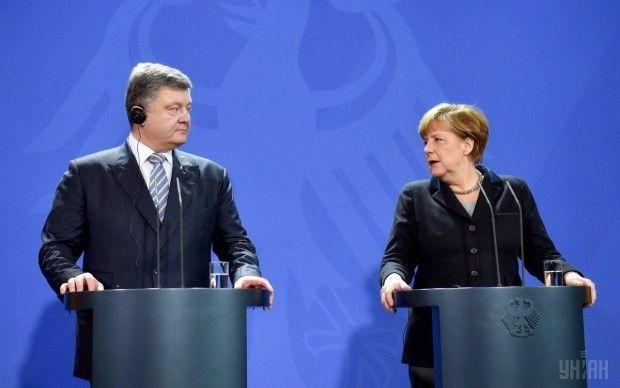
Ukrainian interest. Carrot and stick from Berlin, G-7’s wishes, and increased attention to Crimea
Both in Berlin and Kyiv, various officials from the German government discussed the issue of Donbas settlement with their Ukrainian colleagues. The Ukrainian Cabinet crisis triggered prompt reaction of the G-7 countries. The Crimean issue remains in a scope of attention of the European Parliament and the Ukrainian Foreign Ministry.
The meeting of Angela Merkel and Petro Poroshenko in Berlin has brought encouraging results for the official Kyiv: the German Chancellor assured that the anti-Russian sanctions will remain in place until Minsk Agreements are fully implemented. The Bundeskanzlerin sent a clear message to Vladimir Putin on this issue, although the Kremlin has constantly defied international demands to implement the plan of settlement in the east of Ukraine. But this is only the tip of the iceberg: Merkel and Poroshenko, as well as the delegation of the German Bundestag in Kyiv, were talking about the need to adopt a law on the elections in Donbas and constitutional amendments. Maneuvers with the regulations of the Verkhovna Rada were only a tactical stunt, which was confirmed by almost every episode of the Ukrainian-German dialogue.
But we shouldn’t get upset with Berlin’s political position. The capital of the Europe’s economic and political leader is used to see the agreements implemented, so they expect a similar approach from Ukraine. However, it is extremely difficult to count on reciprocity of Russia, which brings a conflict to a deadlock. Actually, the current state of affairs I Donbas gives no reasons for even cautious optimism.
Meanwhile, the Ukrainian Cabinet crisis got into an international spotlight. G-7 ambassadors have met with the president, prime minister and speaker of parliament in order to be assured that the situation is still under control of Ukrainian authorities. A Statement on the resignation by Minister of Economic Development and Trade Aivaras Abromavicius was perceived by the G7 diplomatic corps as a negative signal for Ukraine. At the same time, IMF Managing Director Christine Lagarde hinted that there may be difficulties regarding the allocation of the next tranche of financial assistance for Ukraine. Objectively, the situation illustrates a thesis vigorously promoted by Russian propaganda in the international arena of Ukraine being a “failed state.” But this time, it’s the Ukrainian political elites who are to be blamed. Their inability to put the national interests above their own ones provokes the new rounds of crisis.
Meanwhile, the European Parliament adopted a resolution calling on the EU Council to link the de-occupation of the Crimea with the lifting of sanctions against Russia. The European Parliament is concerned about the human rights violations, as well as of the rights of ethnic and sexual minorities in Crimea. No surprise, the Russian media were traditionally skeptical about the resolution. Ukraine’s Foreign Minister Pavlo Klimkin said Ukraine is interested in establishing a Geneva Plus format of talks on de-occupation of Crimea, with Ukraine, Russia, the U.S., EU, representatives of Turkey and international organizations as participants. Kyiv needs to take more advantage of the ongoing conflict between Moscow and Ankara. A diplomatic standoff between Putin and Erdogan continues, as the latter has publicly linked the increase in the number of refugees from Syria with intensified Russian bombing.
Yevgeny Magda

